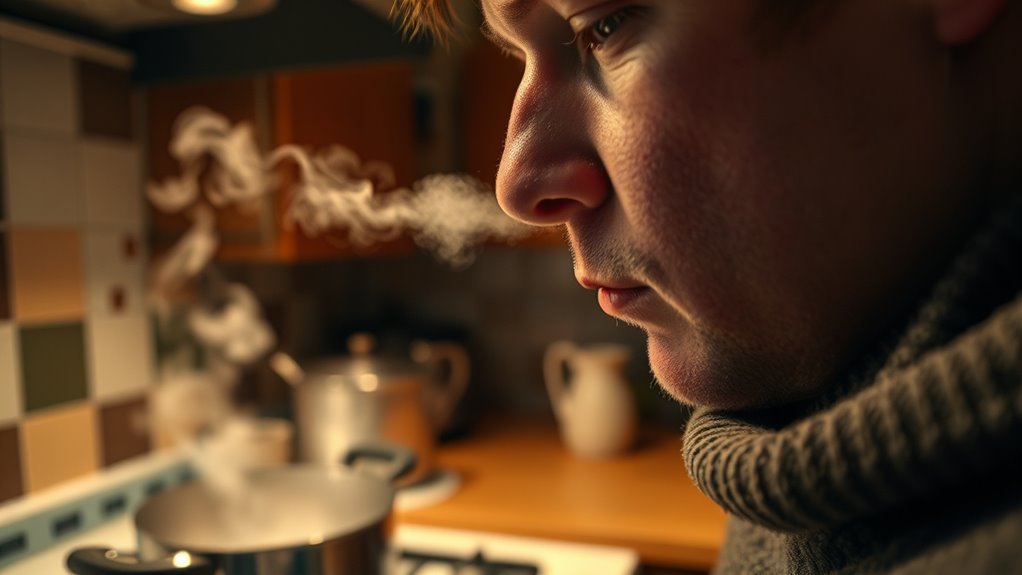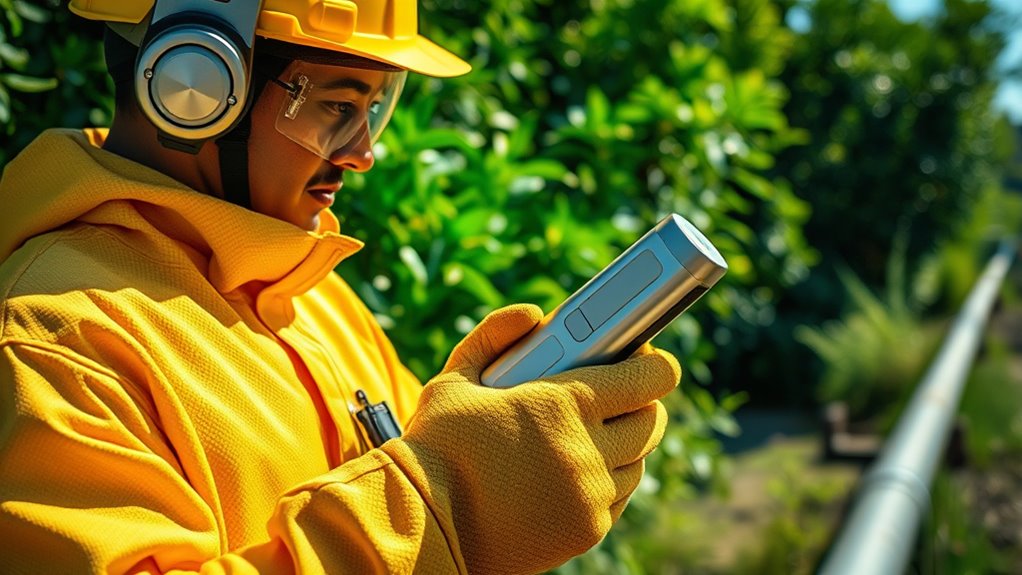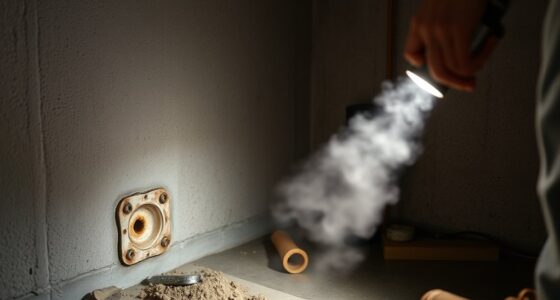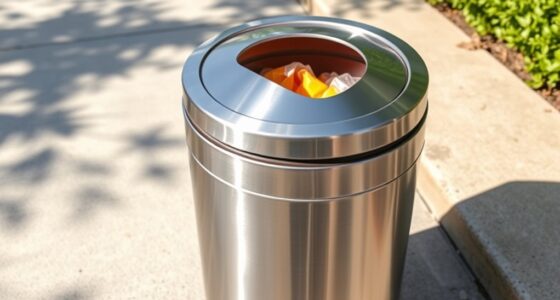You can detect natural gas leaks by smell because added mercaptan gives it a strong, sulfur-like odor similar to rotten eggs or cabbage. If you notice this smell, don’t ignore it—ventilate the area, avoid lighting any flames or switches, and evacuate immediately. Call emergency services or your gas company from a safe distance. To protect yourself and your loved ones, it’s important to know what signs to watch for and how to respond quickly.
Key Takeaways
- Natural gas is odorless; mercaptan is added to give it a distinctive, sulfur-like smell for detection.
- Be alert for faint or unusual chemical-like odors that may indicate a gas leak.
- Smelling rotten eggs, cabbage, or sulfur-like odors near appliances suggests a possible leak.
- Never ignore or try to locate the leak by smell; evacuate immediately if detected.
- Use gas detectors regularly to supplement odor detection and ensure safety.
Recognizing the Odor of Natural Gas

Have you ever wondered how to identify a natural gas leak quickly? One of the easiest ways is by recognizing its distinctive smell. Natural gas is naturally odorless, but utility companies add a chemical called mercaptan, which has a strong, sulfur-like odor. This smell is often compared to rotten eggs or cabbage. If you notice this scent in your home, it’s a clear sign something’s wrong. Keep in mind, the smell can sometimes be faint or masked by other odors, so stay alert. Trust your nose—if it smells unusual and chemical-like, don’t overlook it. Acting quickly can prevent dangerous situations, so always take immediate action if you detect this odor, and ensure everyone evacuates the area. Properly functioning air purifiers with appropriate maintenance can help improve indoor air quality and detect airborne pollutants, but they are not a substitute for immediate action when a gas leak is suspected.
Common Causes of Gas Leaks at Home

Many common household activities and appliances can be the source of gas leaks if not properly maintained. For example, poorly fitted or damaged gas connections on stoves and heaters can permit gas to escape. Over time, pipes may corrode or crack, especially if exposed to moisture or age, leading to leaks. Loose or worn-out fittings and valves also pose risks, often caused by frequent use or rough handling. Additionally, DIY repairs or modifications without proper skills can unintentionally create leaks. Gas appliances that are not regularly inspected or serviced may develop problems, increasing the chance of leaks. Recognizing these common causes helps you stay vigilant and ensure your home’s gas system remains safe. Regular maintenance and prompt repairs are essential to prevent dangerous leaks. Understanding how self-watering plant pots operate can also serve as an analogy for recognizing the importance of proper connections and maintenance in gas systems.
Steps to Take if You Smell Gas

If you smell gas in your home, it’s essential to act immediately to guarantee safety. First, do not turn on or off any electrical switches, as sparks can ignite the gas. Next, open windows and doors to ventilate the area quickly. Then, leave the house promptly, taking everyone with you. Once outside, avoid using phones or anything that could create a spark near the property. Call your gas company’s emergency line or 911 from a safe distance. Finally, wait for professionals to inspect and resolve the leak before re-entering. Remember: staying calm and acting swiftly can prevent accidents. Additionally, understanding Gold IRA Rollovers can enhance your retirement planning, but your immediate priority should be safety.
Safety Tips for Gas Leak Prevention

To prevent gas leaks in your home, regular maintenance and vigilant habits are essential. Check appliances, pipelines, and connections frequently for signs of wear or corrosion. Ensure gas valves are turned off when not in use, especially during repairs or renovations. Keep vents and exhaust systems clear to allow proper ventilation. Install and test gas shutoff valves to quickly stop leaks if needed. Never ignore strange smells or hissing sounds near appliances. Avoid over-tightening fittings, which can cause damage, and use proper tools for maintenance. Keep a clean, clutter-free space around gas appliances to prevent accidental damage. Educate everyone in your household about gas safety and how to respond in emergencies. Staying proactive reduces the risk of leaks and keeps your home safe. Necessary cookies help ensure your safety measures are properly implemented and monitored.
The Role of Gas Detectors and When to Use Them

Gas detectors play an essential role in promptly identifying the presence of harmful gases, such as natural gas leaks, before they reach dangerous levels. They provide an extra layer of safety, especially when smell isn’t enough or you can’t detect leaks visually. You should use gas detectors:
- In enclosed spaces like basements and utility rooms
- Near gas appliances and meters
- When installing new gas equipment
- During maintenance or repairs
- If you smell gas or suspect a leak
These devices alert you immediately, giving you time to evacuate or shut off the gas supply. Regularly testing and maintaining your detectors is critical to ensure they work properly. Remember, gas detectors are an essential safety tool to prevent accidents and protect your household. Proper maintenance of gas detectors ensures their reliability and effectiveness in detecting leaks.
Frequently Asked Questions
How Effective Is Human Smell Compared to Gas Detectors?
You might wonder how effective your sense of smell is compared to gas detectors. Human noses can detect natural gas leaks at low concentrations, but their accuracy varies with individual sensitivity and environmental factors. Gas detectors, however, provide consistent, reliable readings regardless of conditions, offering a safer and more dependable way to identify leaks early. Relying solely on smell isn’t recommended; always use proper gas detection equipment for safety.
Can Natural Gas Leaks Occur Without an Odor?
Ever wonder if a natural gas leak can happen without you noticing? Yes, it can. Natural gas is naturally odorless, so leaks might occur without any smell. That’s why relying solely on your nose isn’t enough. Gas detectors or sensors are essential for safety, especially if the smell of rotten eggs isn’t present. Always verify your home is equipped with proper detection devices to catch leaks early and prevent danger.
What Are Long-Term Health Effects of Gas Exposure?
Long-term exposure to natural gas can cause health issues you should be aware of. You might experience headaches, dizziness, or fatigue over time. In more severe cases, prolonged inhalation can harm your nervous system, cause respiratory problems, or lead to skin and eye irritation. It is crucial to address leaks promptly and ensure proper ventilation, so you’re not exposed to these risks. Regular maintenance helps keep you safe from potential health effects.
How Often Should Gas Detectors Be Calibrated?
You should calibrate your gas detectors regularly to guarantee their accuracy. Typically, it’s recommended to calibrate them at least once every six months, but check the manufacturer’s guidelines for specifics. If you work in an environment with frequent gas exposure or detect any irregular readings, calibrate more often. Regular calibration helps you stay confident in your detector’s performance and keeps your safety measures reliable.
Are There Any Natural Gas Leak Detection Services?
Think of natural gas leak detection services like regular health check-ups—they keep you safe before problems escalate. Yes, many companies offer these services, using advanced sensors and regular inspections to identify leaks early. For example, a homeowner in your area avoided a disaster by hiring a professional who detected a hidden leak. Investing in these services guarantees your safety and peace of mind, just like routine health screenings.
Conclusion
Remember, natural gas leaks are more common than you think—around 5,000 incidents occur annually in residential areas. By recognizing the smell of gas, acting quickly, and using detectors, you can protect yourself and your loved ones. Always stay alert, follow safety tips, and never ignore a gas odor. Staying proactive is your best defense, because a quick response can prevent accidents and save lives. Stay safe and vigilant!









